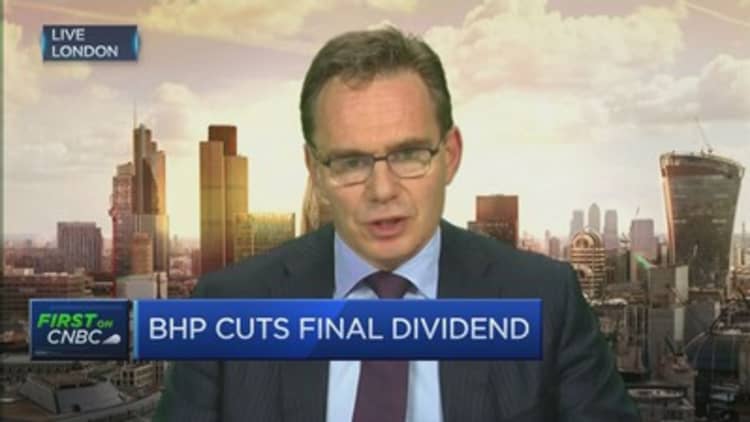






BHP Billiton, the world's largest mining firm by market value, reported a record $6.4 billion annual loss on Tuesday, hammered by a bad bet on shale, a dam disaster in Brazil and a commodities slump.
The biggest element in the loss was one-off charges booked after the collapse of a dam at the Samarco iron ore site in Brazil in November. The site was run as a joint venture with Brazil's Vale and the dam's collapse killed 19 people. The flooding wrecked farm land and reached towns, preventing people from returning to their homes.
"I think it is worthwhile putting that loss into perspective ... most of it is due to exceptional charges that we took for the Samarco dam, for our onshore U.S. business and some tax matters," BHP Billiton CEO Andrew Mackenzie told CNBC after the company's earnings were out.
The Anglo-Australian firm said in its earnings statement that it had recognized a provision of $1.2 billion before tax and after discounting on June 30.
Energy prices
Energy Futures
Even excluding $7.7 billion in writedowns and charges, underlying profit slumped 81 percent to $1.2 billion for the year to June 2016 from $6.4 billion a year ago, hit by weak iron ore, copper, coal, oil and gas prices. The underlying profit was better than analysts' expectations of around $1.1 billion.
As a result of the profit beat, BHP Billiton shares listed on the London Stock Exchange rose by 3.6 percent on Tuesday morning before paring some gains.
UBS confirmed on Tuesday this was BHP Billiton's worst-ever loss since the merger of of BHP Limited and Billiton Plc in 2001. It is believed to also be the largest reported loss for BHP since the company's inception in 1851.
"What kind of bothered me when I saw the numbers (from BHP Billiton) come out was that specifically, even in the second half of the year, all of the commodity prices that they sell fell down by double-digits, as far as what they were receiving is concerned and debt actually rose a little bit here on the annual numbers," Paul Renken, senior geologist and mining analyst at VSA Capital, told CNBC on Tuesday.
"That tells me they are a little bit behind the curve, as far as cost of provisions and so forth ... Other mining companies are being able to see ... improvements in margins and you see that with Antofagasta, for instance."
Metal prices
METAL FUTURES
Mackenzie concurred debt levels could be lower.
"I think there is confidence in the business and the reforms and the simplification that we have driven over the last three or four years has made us much more efficient and we are now using that efficiency in slightly improving markets. But at the same time, we do acknowledge that we would like to have slightly lower debt and therefore we have kept some back for the balance sheet and I think we will continue to do that until our debt is a little bit lower," he told CNBC.
BHP Billiton Group is headquartered in Melbourne, Australia. It is listed on the Australian Securities Exchange and the London Stock Exchange, with a secondary listing in Johannesburg.
The London-listed stock is a component of the benchmark FTSE 100. It has jumped by over 40 percent this year, but remains far-below levels traded at prior to the commodities rout of July 2014 onward.
—Reuters contributed to this article.

